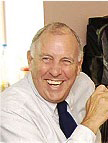
Chris Forrester

A new posting by journalist Chris Forrester at the Advanced Television infosite reveals that there wasn’t much ‘white smoke’ from the FCC’s chairman Ajit Pai in his statement on December 10 in regard to the upcoming C-band auction; however, the Senate Commerce Committee met and approved the 5G Spectrum Act which now goes to the Senate for a formal vote then to the House of Representatives and then for sign off by President Trump.
The Act is more positive than most analysts had feared. Sami Kassab, equity analyst at Exane/BNPP said in a note to investors early on Wednesday, December 12th, detailing the headlines.
“The amended 5G spectrum act sees at least 50 percent of proceeds going to the Treasury for the first $40 billion of proceeds, 75 percent for the following $10 billion and 90 percent thereafter. The Act also entitles satellite operators to receive an incentive (beyond cost compensation) for relinquishing their rights. Our SES valuation is based on gross proceeds of $22 billion so the amendment (higher share for higher proceeds) has no impact. We assume a 61% Treasury share consistent (perhaps too conservative?) with that Bill.”
He added: “This development is more positive than we thought yesterday. First of all, we believe it means that the Republican party has sided with Sen. Wicker and Thune and NOT with Kennedy. It is a key task of Senate Committees to prioritize bills to be submitted to the floor for a vote by the whole Senate. The Commerce Committee had two bills on C-band to prioritize: Kennedy’s anti-satellite Bill and Wicker & Thune pro-satellite Bill. Yesterday, it voted in favour of the Wicker & Thune Bill.
"While Senator Kennedy could, theoretically, bypass this vote and put his own Bill to the floor, we believe this is highly unlikely. For one, he has obtained some amendments to the original Wicker & Thune bill (now talking of an 90 percent Treasury take above $60 billion of gross proceeds…in line with his 100 percent but irrelevant in our valuation framework). Secondly, his bill has 0 cosponsors while Wicker and Thune are now counting 4 cosponsors including Sen. Moran from the Appropriation Committee (where Kennedy seats).
"So, we believe that the pro-satellite Wicker and Thune bill is the C-band legislation chosen by the Republicans. Senator John Thune is the Republican party-whip and second highest ranking Republican Senator. His name carries more weight than Kennedy’s in our opinion.”
Kassab also says that he continues to assume that satellite operators will earn 39 percent of gross proceeds (of $23 billion @ USD0.25 per Mhz POP) representing €5 per share for SES and €2ps for Eutelsat. He noted the company reaffirms their €16 per share Target Price for SES, suggesting more than a 30 percent upside (compared to current trading).”
Chairman Pai then sang the praises – and need – for 5G progress, and an accompanying comment on the terrestrial 5G spectrum auction (in the 37, 39 and 47 GHz bands, under Auction 103), there was little to amplify the FCC’s position on C-band.
Referring to the 5G auction, Chairman Pai’s statement said, “Notably, we’re setting up the Upper 37 GHz, 39 GHz, and 47 GHz auction to be our second-ever incentive auction. This one will be different from the broadcast incentive auction that Congress authorized years ago, but it’ll have the same worthy goal: clearing or repacking existing licensees to make spectrum as useful as possible, boosting competition and benefiting consumers.”
He then added, “Pushing more spectrum into the commercial marketplace is a key component of our 5G FAST plan to advance American leadership in the next generation of wireless connectivity. Earlier this year, we concluded our first-ever high-band 5G auctions of the 28 GHz and 24 GHz bands. Next year, we look forward to initiating two mid-band spectrum auctions—the 3.5 GHz auction on June 25, 2020, and an auction in the 3.7-4.2 GHz band in the latter part of 2020. These and other steps will help us stay ahead of the spectrum curve and allow wireless innovation to thrive on our shores.”

